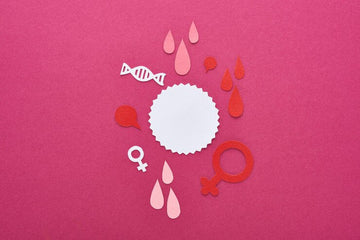The natural menstrual process regulated by hormones like progesterone and estrogen is known as the menstrual cycle. And contributes significantly to reproductive health. Ovulation is regulated by intricate hormonal changes during this cycle, which lasts from 21 to 35 days. It gets the uterus ready for pregnancy. Understanding these hormonal changes is essential, and they affect not only reproduction but also your overall physical and mental health. Reproductive age and puberty are examples of life stages. Menopause enhances hormonal shifts that impact health and cycles. Hormonal imbalance is caused by stress and lifestyle, which can lead to abnormal cycles. Long-term health issues like osteoporosis or heart problems. Knowing these changes helps manage health better and make smarter lifestyle choices.
Important Hormones That Affect Your Menstrual Cycle
Essential hormones, including estrogen, progesterone, and testosterone, affect the menstrual cycle. Each hormone has a specific role. The pituitary gland releases FSH and LH, and increased estrogen helps the uterine lining thicken and prepare for ovulation. After ovulation, the hormone progesterone stabilizes the uterus lining to support pregnancy. If the pregnancy fails, Progesterone levels are reduced.
Triggers symptoms of PMS and menstruation. Although present in small amounts, testosterone increases most during ovulation. This helps increase libido and energy and regulates mood throughout the cycle. The interaction of these hormones ensures a balanced cycle. Understanding their roles highlights their impact on physical and emotional health and reproductive readiness.
How Hormones Affect the Menstrual Cycle at Different Life Stages

1. Teenage Years
The menstrual cycle begins during puberty and is driven by hormonal changes related to estrogen and progesterone. The first cycle often causes a hormonal imbalance, which can cause heavy or irregular periods, severe PMS, and mood swings. These hormonal fluctuations are a regular aspect of the body's changes during puberty.
The intensity of symptoms can differ from person to person. Teens can manage hormonal symptoms by maintaining a healthy diet, exercising regularly, keeping their bodies hydrated, managing stress with relaxation techniques, and seeking medical advice for severe or ongoing problems.
2. 20s and 30s
Hormone levels become more balanced during the 20s and 30s, making periods more consistent. This typically takes 24–38 days. It is normal to experience slight changes in timing or flow. Birth control can help regulate your cycle, relieve PMS symptoms, and manage hormonal symptoms. Pregnancy brings significant hormonal changes, especially during pregnancy and postpartum recovery.
Breastfeeding has a more substantial impact on hormones. Delays ovulation and menstruation by producing prolactin. Recognition of these changes is essential for effective family planning, symptom management, and overall hormonal health during these critical reproductive years.
3. 40s and Perimenopause
Perimenopause signals the transition to menopause, marked by fluctuating estrogen and progesterone levels. Menstrual cycles may be irregular, shorter, or prolonged periods. With occasional heavy bleeding or missed periods, symptoms such as hot flashes, mood changes, and insomnia are normal.
Adapting to these changes requires awareness and proactive care, including regular health check-ups and lifestyle changes. Stress reduction combines eating a nutritious diet and exercising regularly, which can help manage symptoms, ensure a smoother transition, and support overall health.
4. Post-Menopause Life
Menopause is the complete cessation of menstruation. This marks the end of a woman's reproductive years. This change is related to significant hormonal changes. This is mainly by reducing estrogen and progesterone levels. Symptoms of menopause include hot flashes, night sweats, Mood swings, and vaginal dryness. Long-term effects of low estrogen levels can affect bone density. Increased risk of osteoporosis affects heart health and skin elasticity. Managing these changes requires a concerted shift in lifestyle and medical support for overall health.
How the Body Reacts to Hormonal Imbalance?
Hormonal imbalances, such as PCOS or thyroid disorders, Can disrupt the regularity of the menstrual cycle. This causes irregular or missed periods. Heavy bleeding or difficulty having children. These imbalances also affect overall health. This causes symptoms such as weight gain, mood swings, fatigue, and skin problems. Proper management is essential.
Tips for Healthy Hormones
|
Conclusion
Hormones play a crucial role in regulating the menstrual cycle and overall health. It's important to understand how they change at different life stages to manage their effects. From puberty to menopause, knowing these changes allows people to take steps to keep hormones balanced. A healthy lifestyle with good nutrition, regular exercise, and stress management supports hormonal health. It’s also important to consult the doctor when needed to manage any hormone-related issues. People can better handle hormonal changes and improve their long-term health by staying informed and focusing on overall wellness. This proactive approach ensures that individuals can live healthier and more balanced lives as they go through different stages of life.
FAQ’s
What Are The Four Happy Hormones?
The four happy hormones are dopamine, serotonin, oxytocin, and endorphins. These natural chemicals enhance mood, relieve stress, and promote joy, connection, and relaxation. Activities, relationships, and a balanced lifestyle trigger them.
How Do Hormones Interact To Control The Menstrual Cycle?
FSH, LH, estrogen, and progesterone coordinate the menstrual cycle. They regulate ovulation, prepare the uterine lining for pregnancy, and trigger menstruation when conception doesn't occur, ensuring the body maintains a regular reproductive rhythm.
What Hormone Stops Your Period?
Progesterone halts menstruation during pregnancy by preserving the uterine lining and preventing its shedding, creating a stable environment to support the fetus's growth and development throughout pregnancy.
When Is The Most Unsafe Period?
The highest risk of pregnancy occurs during ovulation, typically around the middle of the menstrual cycle, between days 12 and 16 of a 28-day cycle, when an egg is released and fertility peaks.
How Do Hormones Affect Women's Behavior?
Hormones impact mood, energy, and emotional responses. Estrogen boosts energy and positivity, progesterone may cause calmness or irritability, and testosterone enhances libido. Imbalances can lead to mood swings, fatigue, or anxiety.





